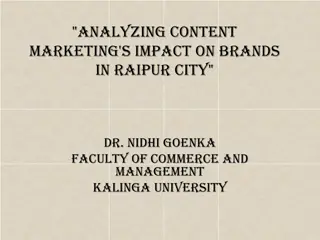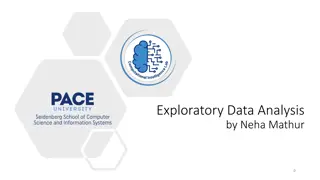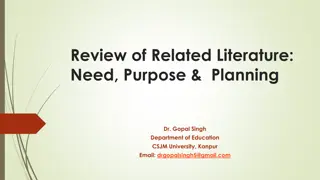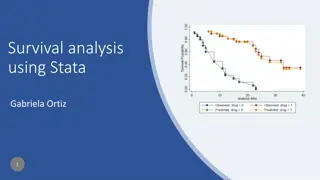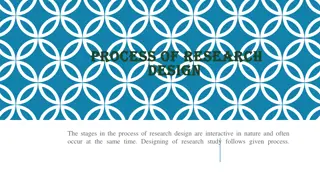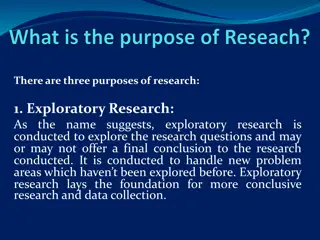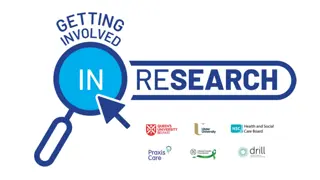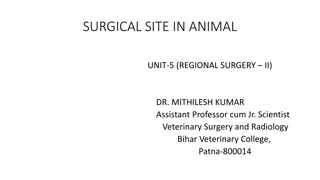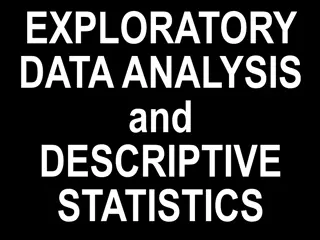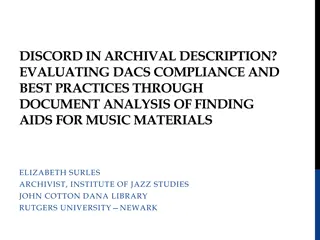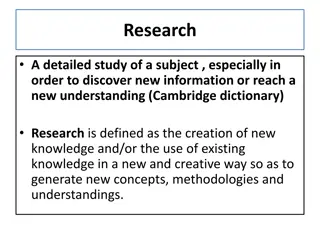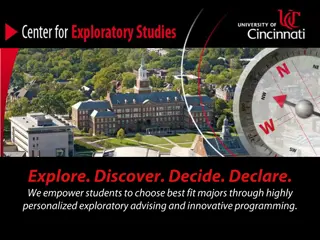Understand the Process, Stages, and Types of Research Design
The process of research design involves interactive stages that occur simultaneously, leading to the classification of research design into exploratory, descriptive, and experimental types. Each type serves a unique aim, from understanding problems to testing hypotheses through structured experiment
3 views • 8 slides
Understanding Data Types and Summary Statistics in Exploratory Data Analysis
Data types, including discrete numerical, continuous numerical, ordinal, and nominal, are essential in exploratory data analysis. Variables can be categorized based on their nature, such as numerical variables (interval vs. ratio) and categorical data summaries. Learn about USGS flow measurements, n
4 views • 48 slides
Understanding the Process and Types of Research Design
The process of research design involves interactive stages that occur simultaneously, leading to the designing of a research study. This includes steps in research design, classification of research design types, such as exploratory, descriptive, and experimental/causal research design. Each type se
12 views • 8 slides
Interpretation
Interpretation in research methodology involves drawing inferences from collected data, establishing continuity in research, and developing explanatory concepts for future studies. It helps researchers understand abstract principles, make predictions, and maintain research continuity. Interpretation
4 views • 5 slides
Latest Research and Studies on Lung Cancer - Update May 2024
This research update includes information on national recruitment to lung cancer studies, comparison of national vs. regional recruitment, and detailed descriptions of various studies and trials related to lung cancer. The studies cover areas such as treatment advancements, observational studies, ma
2 views • 13 slides
Impact of Content Marketing on Brands in Raipur City
This study by Dr. Nidhi Goenka at Kalinga University examines the impact of content marketing on brands in Raipur City. It aims to enhance consumer knowledge of marketing developments, making information on goods and services more accessible. The research uses exploratory and descriptive approaches
0 views • 13 slides
Understanding Exploratory Data Analysis (EDA) for Effective Data Insights
Exploratory Data Analysis (EDA) is a crucial approach for analyzing data by utilizing various techniques to extract insights, identify anomalies, and visualize trends. By leveraging EDA using tools like Pandas, researchers can improve their understanding of data variables, detect errors, and explore
2 views • 14 slides
Veterinary Surgical Procedures Overview
Veterinary surgical procedures such as spaying, neutering, exploratory surgeries, bladder stone removal, and surgical fracture repair are essential for maintaining the health and well-being of animals. Exploratory procedures help diagnose issues when other tests fail to reveal abnormalities, and sur
1 views • 31 slides
Understanding Literature Reviews: Process, Purpose, and Types
A literature review is an essential part of academic research, providing a synthesis of existing studies on a topic. It involves reviewing published information within a specific subject area to help the reader understand the research background. The process of conducting a literature review is meti
0 views • 70 slides
Survival Analysis Using Stata - Overview and Data Examination
This content discusses survival analysis using Stata, covering topics such as survival-time data, exploratory graphs, estimation, models, predictions, diagnostics, testing assumptions, and more. It explains how survival-time data is measured and discusses various examples and scenarios related to su
1 views • 83 slides
Overview of Media Studies Disciplines and Historical Development
Media studies is a multidisciplinary field that explores the content, history, and effects of various media, with roots in the relationship between media and culture. Originating in the 1920s, media studies draws on traditions from social sciences and humanities, incorporating theories from discipli
5 views • 18 slides
Understanding Interviews: Construction, Types, and Methodologies
Interviews are essential for collecting data in exploratory research. This content elaborates on the construction, types, and methodologies of interviews, including unstructured and structured approaches. Tips for minimizing bias, training interviewers, and the benefits of face-to-face interviews ar
0 views • 50 slides
Understanding the Process and Types of Research Design
The process of research design involves interactive stages occurring simultaneously, leading to the creation of a structured study. There are three main types of research design: exploratory, descriptive, and experimental (or causal). Each type has its own objectives and methods. Exploratory researc
0 views • 7 slides
Algonquin Middle School Overview
Algonquin Middle School, led by Principal Andrew Reinke and Assistant Principal David Rumoro, provides a comprehensive education for grades 6-8. The school's curriculum covers core subjects like Math, ELA, Social Studies, and Science, with an accelerated course option available. Students follow a st
7 views • 20 slides
Exploring Teacher Recruitment and Retention in Physics and Chemistry Education
Anna Holbrook, a Course Leader for Physics on the Secondary PGCE at Bath Spa University, is conducting research on teacher recruitment and retention in physics and chemistry education. The project aims to understand the impact of IOP/RSC scholarships and SKE courses on novice teachers' early careers
0 views • 12 slides
Understanding Clinical Trials: Types and Designs
Clinical trials are essential research studies that evaluate new tests and treatments to improve human health outcomes. They involve various phases, designs, and purposes, such as treatment trials, prevention trials, and observational studies. Different types of clinical trial designs include experi
7 views • 18 slides
Understand the Three Purposes of Research
Explore the realms of exploratory, descriptive, and explanatory research. Discover how each type serves unique objectives in the research process, from uncovering new problem areas to validating findings. Learn about the structured and unstructured approaches used in different research methodologies
1 views • 11 slides
Understanding Research Methods: Quantitative, Qualitative, and Mixed Approaches
This introduction provides an overview of qualitative, quantitative, and mixed methods research, highlighting key differences and various types of research approaches. It delves into exploratory, descriptive, and causal research methodologies, offering insights into problem discovery, data collectio
0 views • 50 slides
Surgical Sites in Animal Surgery: Techniques and Procedures
Incisions in animal surgery are crucial for various procedures like exploratory laparotomy, rumenotomy, and correction of intestinal obstructions. The most common incision sites in cattle include the flank and ventrolateral areas, each serving specific surgical needs. Proper technique during incisio
6 views • 21 slides
Workshop on Data Analysis in Business and Law at University of Nigeria, Nsukka
This workshop at the University of Nigeria, Nsukka focuses on data analysis in business and law, covering topics such as measurement, scaling, data preparation, analysis, and interpretation. Participants will learn about the importance of data integrity, statistical tools, and the benefits of ICT in
4 views • 21 slides
Exploratory Data Analysis and Descriptive Statistics in Statistical Analysis
Exploratory Data Analysis involves understanding data characteristics through visualization techniques like bar graphs, pie charts for qualitative data and histograms, scatterplots for quantitative data. It includes calculating mean, median for center, range, standard deviation for spread, and ident
1 views • 7 slides
Managing Tension Between Creativity and Efficiency: A Framework for Uncertainty in Innovation
Explore the tension between creativity and efficiency in innovation through Pearsons' Uncertainty Map (1991), which categorizes uncertainty about ends and means. The map helps analyze uncertainty in various innovation processes, from exploratory research to improving existing products, offering insi
3 views • 42 slides
Understanding the Primary Goal of Exploratory Data Analysis
Exploratory data analysis (EDA) is a crucial step in the data science process. Scientists and data analysts use it to evaluate and condense datasets in order to find trends, identify anomalies, and test theories.
1 views • 13 slides
Exploring Values and Spirituality in University Classrooms
Exploratory research delves into the incorporation of values and spirituality in university classrooms based on a survey conducted among 59 respondents, showcasing motivations, comments, and support/opposition found among colleagues for such initiatives. The study highlights the significance of addr
1 views • 32 slides
Hematological Cancer Clinical Studies Update and Recruitment Statistics
Latest update on hematological cancer clinical studies from the SWAG.Network Haematological Cancer Clinical Advisory Group, including national recruitment data, regional recruitment comparisons, open studies, and sample size information for ongoing studies. This comprehensive update covers a range o
0 views • 14 slides
Former Exploratory Students' Tips for Finding the Best Fit at GV!
Explore what tips and resources former exploratory students have utilized to find their best fit at Grand Valley State University (GV). Discover insights on majors declared, including Criminal Justice, Political Science, Wildlife Biology, and more. Gain valuable information on navigating as a transf
0 views • 28 slides
Evaluating DACS Compliance in Archival Music Collections
This research focuses on evaluating DACS compliance and best practices through document analysis of finding aids for music materials. Elizabeth Surles, an archivist at the Institute of Jazz Studies, explores the challenges in describing music archives and the impact of musical style on documentation
0 views • 21 slides
Impact of Organisational Factors on Career Success of Black Employees in South Africa
This exploratory study investigates the influence of organisational and individual factors on the subjective career success of black employees in the South African work environment. The research employs a mixed-methods design with three phases - qualitative, pilot quantitative, and main quantitative
0 views • 14 slides
Understanding HARKing and the Importance of Exploratory vs. Confirmatory Research
HARKing (Hypothesizing After the Results are Known) involves presenting unexpected findings as if they were predicted and treating exploratory work as confirmatory. Exploratory research allows for hypothesis generation, while confirmatory research focuses on hypothesis testing. It is crucial to diff
0 views • 17 slides
Advances in Baryon Spectroscopy and Hadronic Matter Studies
Discussions at the meeting focused on interpreting HADES results for e+e- and meson production in hadronic reactions, with studies involving proton, pion, light, and heavy ion beams. The role of time-like electromagnetic transitions, baryon spectroscopy, and connecting hadronic matter studies were e
0 views • 12 slides
Understanding the Purpose of Research: Exploratory, Descriptive, and Explanatory Studies
Research is a systematic inquiry process that involves data collection, critical information documentation, analysis, and interpretation. It serves three main purposes: exploratory research to explore questions, descriptive research to expand knowledge on current issues, and explanatory research to
0 views • 14 slides
Classifying Entities into an Incomplete Ontology: Exploratory EM Approach
The research discusses methods for hierarchical classification of entities into incomplete ontologies. It explores the challenges of evolving web-scale datasets and the need for classifying entities in an incomplete ontology structure. The Hierarchical Exploratory EM model is detailed, providing ins
0 views • 27 slides
Understanding Targeted Clinical Investigation in Pharmacovigilance
Targeted clinical investigation plays a crucial role in pharmacovigilance by further evaluating significant risks identified in pre-approval clinical trials. This involves conducting pharmacokinetic and pharmacodynamic studies, genetic testing, interaction studies, and large simplified trials to ass
0 views • 12 slides
Concentration and Minor Requirements for Bachelor of General Studies (BGS)
Bachelor of General Studies (BGS) students at Northwestern State University of Louisiana must complete a concentration consisting of 36 hours, with a minimum of 12 hours at the 3000 and 4000 levels taken at NSU. The popular concentrations are Social Science, Computer & Natural Science, and Arts & Co
0 views • 9 slides
Exploring Pesticide Monitoring and Contamination Studies in Maine
Mary Tomlinson's work with the Maine Board of Pesticides Control includes past studies on groundwater and surface water monitoring, ongoing monitoring initiatives, and future collaborative studies. The State Law mandates residue surveys to identify possible contamination sources and develop a pestic
1 views • 55 slides
Adventist Health Studies Contributions & Collaborations Overview
Adventist Health Studies have made significant contributions to understanding the health and longevity advantages of Seventh-day Adventists, particularly focusing on vegetarian diets and cardiovascular health. With a history spanning over 57 years and various cohort studies, these studies have provi
0 views • 12 slides
Vocational Exploratory Program 2023-24 - Career Interest Assessment and Guidance
Engage in the Vocational Exploratory Program for the 2023-24 school year to understand your career interests through activities like the Career Interest Profiler. Explore various aspects of your personality and work preferences without being confined to a specific career choice. Utilize tools like N
0 views • 24 slides
Exploratory Freshman & Conditional Admission Proposals Overview
The Academic Standards Committee at Auburn University developed two proposals in response to the 2013-2018 strategic plan's objectives, focusing on promoting academic success and enhancing freshmen programs. Ad hoc committees formed recommendations, leading to the submission of specific exploratory
0 views • 12 slides
Building a Food Studies Center at Met College
Establishing a Food Studies Center at Met College, driven by the merging of Food and Wine courses with Gastronomy programs, aims to integrate hands-on and academic approaches to food studies. Drawing inspiration from existing models like the Culinaria Research Centre and the Center for Regional Agri
2 views • 8 slides
Center for Exploratory Studies - Academic Programs and Resources
Center for Exploratory Studies offers a range of academic programs and resources for students exploring their educational paths. Learn about FERPA guidelines, student commitment, advising models, types of exploratory students, and more. Explore major exploration resources, course schedule samples, a
0 views • 12 slides





